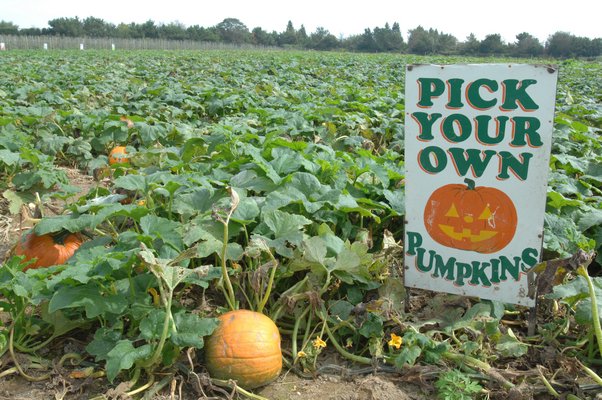
Hank Kraszewski Jr. of Hank’s Pumpkintown, the behemoth of agritourism on the South Fork, got his start in the industry on what he calls a “whim.”
Mr. Kraszewski was already selling pumpkins when he and his wife, Lynn, bought their first climb-aboard wooden toy, a replica horse and buggy, on a trip to Amish country in the early 1990s. They thought it would be fun for their then-toddler Kristin to play on at the Water Mill farm. Laughing, Mr. Kraszewski said it turned out to be fun for all the customers, as well.“They don’t come to pick a bag of apples and leave,” agreed Tim Kraszewski, his younger brother, who's also heavily invested in the agritainment industry. His own Water Mill farm, Seven Ponds Orchard, off Seven Ponds Road, features wooden toys like a castle and pirate ship, as well as a corn maze and prepared foods like candied apples and roasted corn. A recent favorite life-size toy was a Star Wars" Naboo Starfighter.
Tim Kraszewski purchased his 23 acres in 1999. The tract had a preexisting conservation easement to preserve it as farmland, thanks to work of the Peconic Land Trust.
Given his relatively small acreage when it comes to food production, Tim Kraszewski says that adding "value" to the land—whether through agritainment or by selling prepared goods like cider or donuts made from raw produce—is essential.
“We’ve always had to redirect ourselves. There is plenty of productivity on a smaller scale,” said Hank Kraszewski Jr. Last year he farmed 450 acres, 163 of which he owns, but he lost some of the land he rents and can hope to farm no more than 325 acres this year. Most of the land he lost is being developed, he said.
Even so, Mr. Kraszewski said he's not worried about the coming season, because he believes he can increase productivity on the remaining 325 acres by adding deer fencing and greenhouses. However, he said his family most likely will no longer farm potatoes, as "they are just not profitable anymore.”
As less land is available for leasing to farmers, crops like potatoes with low profit margins are simply not as viable. Farmers are increasingly turning to “value-added” production of items like hard cider and apple donuts, not to mention agitrainment.
Countywide, the agritainment industry is exploding. In 2002, only 10 Suffolk County farms engaged in agricultural tourism, producing only $18,000 in revenue, according to U.S. Census data. In 2010, there were 91 farms reporting agritourism as a generator of revenue, which by then had leapt to almost $4.25 million.
Suffolk County amended its purchase of development rights program in 2013 to recognize facets of agritourism, including corn mazes and U-Pick sites, as viable uses after development rights have been sold to the county.
“Agritourism and value-added processing have become important elements in the business models of many Suffolk County farmers,” said Suffolk County Executive Steve Bellone in a recent email.
Mr. Bellone said that the 2013 amendments were intended “to ensure that we are taking pro-active steps to accommodate current business practices and to ensure the long-term economic viability of this essential Long Island industry.”
“Agritainment does take a long time to develop. People look at it and think, ‘Wow, you’re doing great,’” said Tim Kraszewski. He estimates that it took around five years for his orchards to grow enough apples for a U-Pick. His farm also offers U-Pick raspberries, blueberries, blackberries, as well string beans, tomatoes, snap peas and sunflowers.
This year’s sunflower season was longer thanks to a mild fall, and Mr. Kraszewski says he’d never seen more sunflower photos on Instagram. In fact, a strong online and social media presence is integral to the brothers' business—and that, like the orchards, takes time to grow.
Mr. Kraszewski said that parents relish an opportunity to teach their kids about agriculture, as well as to pick something they can then eat the same night for dinner. “They are reaching for something to do in the summer,” he said, recalling when the actor Neil Patrick Harris visited the farm with his own two children.
“We live in a farm community, or what used to be,” said Hank Kraszewski Jr. “The kids on Long Island aren’t getting any agricultural education.” He recalls school trips where even East End children were shocked to discover that vegetables did not originate in the supermarket.
The Kraszewski brothers feel agritourism works to engage young people so they can learn about agriculture. Some of their toys—Seven Ponds Orchard’s climb-on replica of a wooden sawmill, Pumpkintown’s combine transformed into a slide—are intended to showcase local history as well as aspects of the farming process.
“There is an importance of knowing where your food comes from," said Hank Kraszewski.
His son "little Hank" recently purchased 19.2 acres through the newly designed enhanced development rights program—a point of pride for his father, who said such programs are the only way young farmers will be able to afford any land on which to grow food crops.
“It hurts my heart to see land just lie fallow, when we lose land every year,” said Hank Kraszewski Jr.
"